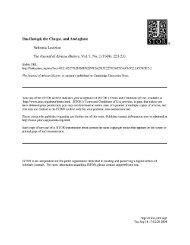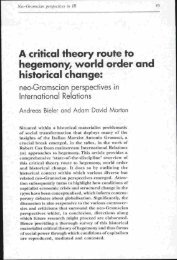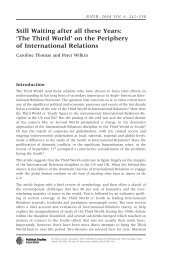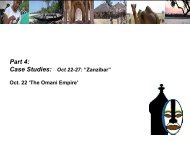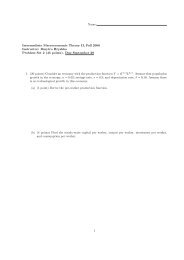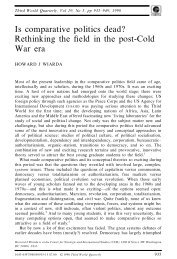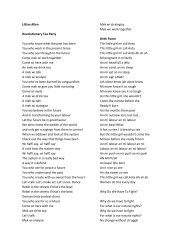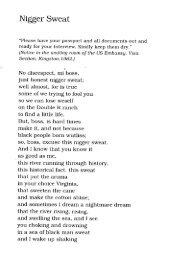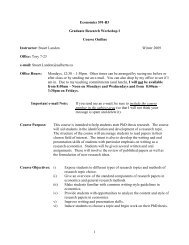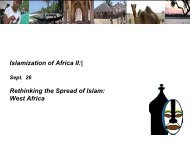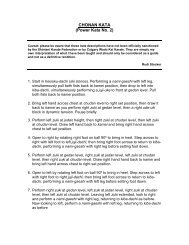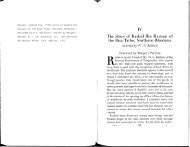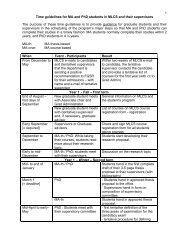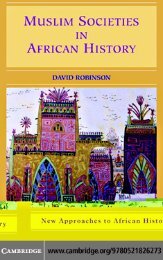personal memories revolutionary states and indian ocean migrations
personal memories revolutionary states and indian ocean migrations
personal memories revolutionary states and indian ocean migrations
You also want an ePaper? Increase the reach of your titles
YUMPU automatically turns print PDFs into web optimized ePapers that Google loves.
26 For an excellent review of the culture wars see Robert Brightman, “Forget Culture: Replacement,<br />
Transcendence, Relexification,” Cultural Anthropology 10, no. 4 (1995): 509 – 546.<br />
27 Michele de Certeau, The Practice of Everyday Life (Los Angeles: University of California Press, 1984)<br />
28 Fredric Jameson, Postmodernism, or, the Cultural Logic of Late Capitalism (Durham: Duke University<br />
Press, 1993), 94. Jameson uses the terms history <strong>and</strong> historicism to refer not only to the<br />
contextualization of events in a diachronic narrative. He is also referring to what he sees as the demise<br />
of the Marxist sense of history as dialectic. He has long held that Marxism is the point at which theory<br />
<strong>and</strong> history find common ground. See his comments in the preface to Fredric Jameson, The Political<br />
Unconscious (Ithaca: Cornell University Press, 1981), 13-14. I am well aware that Jameson is a<br />
controversial figure among post-colonial theorists particularly for his characterization of “third world<br />
literature” as non-canonical. As Aijaz Ahmad points out, Jameson takes his Hegel seriously viewing<br />
societies outside the West as societies without history <strong>and</strong> therefore outside “Civilization.” Aijaz<br />
Ahmad, In Theory: Classes, Nations, Literature (London: Verso, 1992), 95 – 122. However, as an<br />
important actor in the debates on postmodernism, his views on history are pertinent here.<br />
29 Lila Abu Lughod, Writing Women's Worlds: Bedouin Stories (Berkeley: University of California Press,<br />
1993), 6 – 14.<br />
30 See my reference to Pearson above.<br />
31 Abu Lughod, Writing Women's Worlds, 23.<br />
32 Amselle, Mestizo Logics: Anthropology of Identity in Africa <strong>and</strong> Elsewhere, 2. I am indebted to Peter Mark<br />
for generously sharing his ideas <strong>and</strong> sources on cultural mixing, especially the work of Amselle. See<br />
Peter Mark, “Portuguese” Style <strong>and</strong> Luso-African Identity: Precolonial Senegambia, Sixteenth-Nineteenth Centuries<br />
(Bloomington: Indiana University Press, 2002).<br />
33 Many scholars who insist that the Swahili are Africans prefer not to discuss how that identity is<br />
related to slavery.<br />
34 This is not an unproblematic number. Richard Burton wrote that in 1859 estimates of the total<br />
population of Zanzibar ranged from 100,000 to 1,000,000. When he asked Seyyid Said how many<br />
“subjects” he had on the isl<strong>and</strong>, the Sultan replied, “How can I know when I cannot tell you how<br />
many there are in my own house?” He finally settled on 300,000 as a compromise <strong>and</strong> estimated the<br />
slave population at between two thirds <strong>and</strong> three quarters. Richard Francis Burton, Zanzibar: City,<br />
Isl<strong>and</strong> <strong>and</strong> Coast, 1st reprint ed. (London: Tinsley Brothers, 1872; reprint, 1967), 312. Abdul Sheriff has<br />
proposed that the numbers of slaves in any given area—isl<strong>and</strong> or coast--fluctuated widely as the<br />
export dem<strong>and</strong> for cloves, grains <strong>and</strong> oils rose <strong>and</strong> fell throughout the nineteenth century. Abdul<br />
Sheriff, Slaves, Spices <strong>and</strong> Ivory in Zanzibar: Integration of an East African Commercial Empire into the World<br />
Economy, 1770 - 1873 (London: James Currey, 1987). Nevertheless, slaves remained a significant<br />
portion of the population along the coast even after slavery was officially abolished by Seyyid Said’s<br />
gr<strong>and</strong>son, Seyyid Hamoud bin Mohamed bin Said in 1897.<br />
35Edward W. Said, Orientalism (New York: Vintage Books, 1994), 5-6. For Said the dominant group<br />
was the West, i.e. Europe <strong>and</strong> the United States.<br />
36 Including Said’s arch nemesis Bernard Lewis for whom Islam was (<strong>and</strong> is) always the “determining<br />
factor” of analysis. Cooper was particularly critical of Lewis for talking about “Islam’s attitude”<br />
toward racism. Islam he noted does not have attitudes, people do. Frederick Cooper, “Islam <strong>and</strong><br />
Cultural Hegemony,” in The Ideology of Slavery in Africa, ed. Paul E. Lovejoy (Beverly Hills: Sage<br />
Publications, 1981), 273.<br />
37 Sheriff, Slaves, Spices <strong>and</strong> Ivory in Zanzibar, 49.<br />
38 See for example Fred Morton, Children of Ham: Freed Slaves <strong>and</strong> Fugitive Slaves on the Kenya Coast, 1873<br />
to 1907 (Boulder: Westview Press, 1990).<br />
39 Abdul Hamid Mohamed el Zein, “Beyond Ideology <strong>and</strong> Theology: The Search for the<br />
Anthropology of Islam,” Annual Review of Anthropology 6 (1977): 241.<br />
40Cooper, “Islam <strong>and</strong> Cultural Hegemony,” 273 & 97. Some new work on the intellectual history of<br />
Zanzibar <strong>and</strong> East Africa may add some credibility to Cooper’s argument on the influence of the<br />
‘ulama but it is very early days yet. I am aware of several people working in the field, one book on the<br />
topic that has been published, Anne K. Bang, Sufis <strong>and</strong> Scholars of the Sea: Family Networks in East Africa,<br />
1860-1925, Indian Ocean Series (London; New York: Routledge, 2003) <strong>and</strong> a Ph.D. dissertation, Amal N.<br />
Ghazal, “Islam <strong>and</strong> Arabism in Zanzibar: The Omani Elite, the Arab World <strong>and</strong> the Making of an<br />
Identity, 1880s-1030s” (Ph.D. Dissertation, University of Alberta, 2005).<br />
41Talal Asad, Genealogies of Religion: Discipline <strong>and</strong> Reasons of Power in Christianity <strong>and</strong> Islam (Baltimore:<br />
Johns Hopkins University Press, 1993), 210.<br />
42 Michel Foucault, “Truth <strong>and</strong> Power,” in Power/Knowledge: Selected Interviews <strong>and</strong> Other Writings, ed.<br />
Colin Gordon (New York: Pantheon Books, 1980), 82 – 83.<br />
http://web.mit.edu/cis/www/mitejmes/<br />
19



